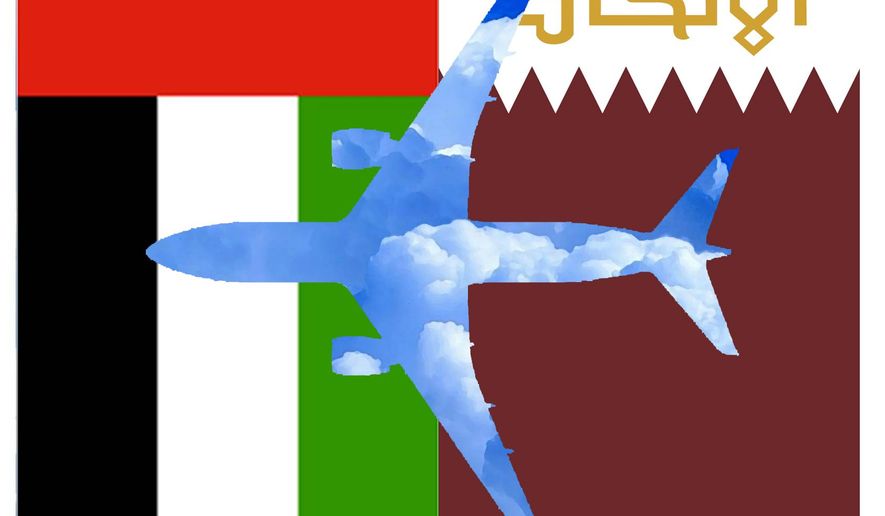OPINION:
Prior to winning the White House, President Donald Trump pledged if he were to occupy the Oval Office, one of his first tasks would be to look into every violation of a trade agreement a foreign country is using to harm American workers and then direct his staff to “use every tool under American and international law to end these abuses.”
Investigating the Open Skies agreement — where Persian Gulf airlines are unfairly undercutting their U.S. competitors, forcing them to cut routes and sacrifice U.S. jobs — is a good place to start.
The oil-rich governments of the United Arab Emirates and Qatar have given their airlines an unprecedented $50 billion in subsidies since 2004, which includes money for airport expansions and renovations, new airplanes, and fuel. They can price their tickets low and offer luxurious service, all because they don’t need to be concerned with turning a profit.
Because of this, Emirates Airline, Etihad Airways and Qatar Airways have become among the fastest growing carriers in the world, with Dubai’s airport now the world’s busiest. Bottom line: The Big 3 U.S. carriers — American Airlines, Delta Air Lines and United Airlines — are competing against governments not corporations. And that’s not fair.
It’s also in violation of the so-called Opens Skies agreement, which allows the Gulf carriers access to the U.S. marketplace so long as their government doesn’t extensively assist its airlines. The agreement has allowed Emirates to ramp up its operation in the U.S., adding Newark Liberty to its U.S. map this year, making it its 12th U.S. destination.
As the Middle Eastern airlines expand their international footprint because of the Open Skies agreement, the U.S. airlines’ has shrunken. The Big 3 have had to cancel most of their Gulf flights, because they can’t compete with the Middle Eastern carriers’ undercut ticket prices.
U.S. airliners are also pulling back from their trips to India, and are worried continued Gulf pressure may limit their European routes.
So, the Middle East is taking advantage of the Open Skies agreement to bolster their international market-share, all the while, not honoring their end by accepting federal subsidies, which obliterates the fair, market-based competition they agreed to.
So the Big 3 are taking their case to Mr. Trump — who has promised to put American interests first.
Earlier this month Delta CEO Ed Bastian and United CEO Oscar Munoz met with Mr. Trump in the Oval Office, to discuss U.S. economic growth and job creation — something that will be crushed if the Gulf airliners have their way.
The CEOs also wrote Secretary of State Rex Tillerson, citing “significant harm,” to the U.S. airline industry because of the Gulf subsidies. They asked Mr. Tillerson merely to enforce the existing open sky agreements — something that the Obama administration failed to do.
“The subsidies allow the Gulf carriers to operate without concern for turning a profit, unlike U.S. airlines, and therefore focus entirely on stripping market share and driving out competition,” the CEO’s wrote in a letter dated Feb. 1. “The subsidy-enabled capacity dumping by the Gulf carriers has nearly eliminated U.S. carrier service to the Middle East and India In fact, for every long-haul route lost or foregone as a result of subsidized Gulf carrier competition, more than 1,500 American jobs are lost.”
Of course, the Gulf airlines dispute the U.S. case, with Emirates turning the subsidy accusation on its head, arguing it had not “depend[ed] on government subsidies, bailouts, and bankruptcy laws,” unlike the U.S. carriers.
Yet, it’s indisputable the Middle Eastern airlines have other advantages. First, none of the three Gulf carriers pays anything in the nature of corporate income tax, Allan I. Mendelsohn, wrote in a paper, “Unraveling the Open Skies” published by McGill University.
Secondly, neither Qatar nor the U.A.E. has any labor laws its airlines have to abide by — unlike U.S. carriers — that protect, much less enhance, the rights of their airlines’ employees, Mr. Mendelsohn notes. Both of these additional costs could be viewed in the lens of an unfair subsidy.
Yes, some U.S. carriers like JetBlue oppose the Big 3 effort — but their opposition only stems from the money they make from connections to the Middle East airlines. JetBlue has growing interline partnerships with all three big Gulf carriers.
It also doesn’t operate flights to the Middle East or India — where the Gulf airliners are dominating traffic to and from the U.S., therefore JetBlue’s interests are much different than the major U.S. airliners.
FedEx also opposes the measure because it’s opened a major cargo hub in Dubai and doesn’t have to compete with the Gulf airliners in terms of ticket prices. It’s concerned if the open skies agreement is enforced, it may lose access to some of its routes.
The Trump administration needs to ensure this doesn’t happen, while standing up for the competition concerns of the Big 3. Vice President Mike Pence met with FedEx founder and CEO Frederick Smith last month, and although their discussion wasn’t publicly disclosed, the open skies agreement was most likely on the docket.
If Mr. Trump was serious when he said on the campaign trail the “negotiation of great trade deals, is the quickest way to bring our jobs back to our country,” then his administration should examine and enforce the open skies agreement between U.S. airliners and the Middle East.
It’s time to put Americans first — most notably the 11 million who have jobs in aviation — and put an end to this rigged game, where the Middle East comes out on top.
• Kelly Riddell is a columnist for The Washington Times.




Please read our comment policy before commenting.